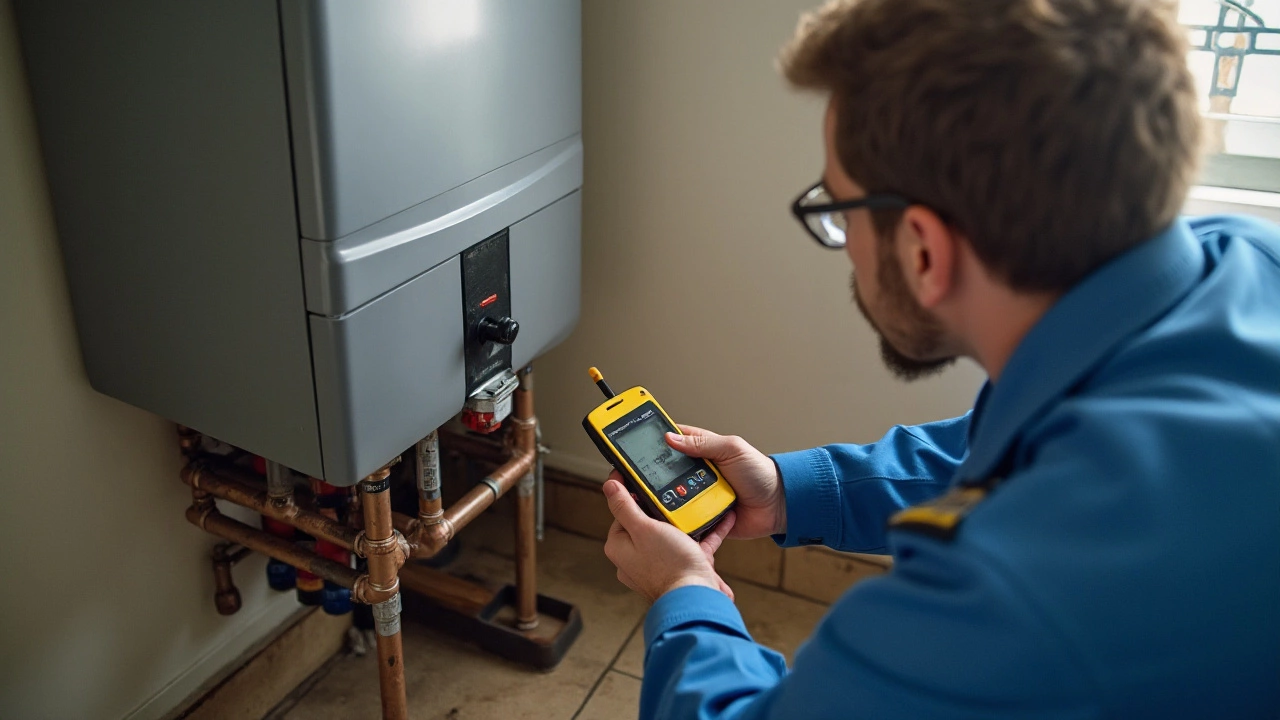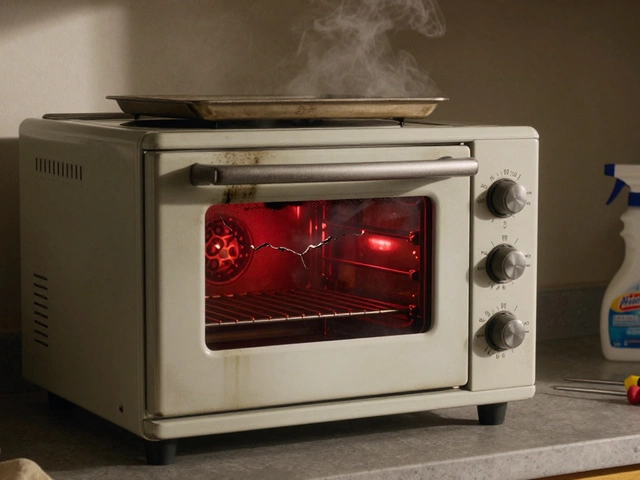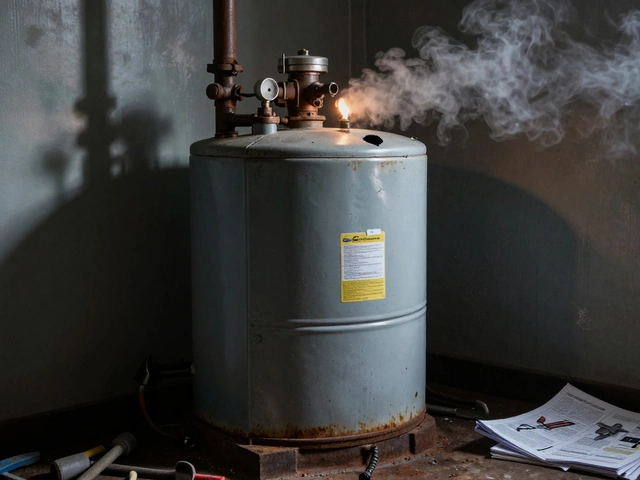A boiler is more than just a device in your home; it's the backbone of your daily comfort during chilly months. Keeping your heating system running smoothly is crucial, so being aware of potential issues is key. But when exactly should you start worrying about your boiler?
This guide breaks down the essential signs that indicate your boiler may need some attention. From unusual noises to unexpected increases in your energy bills, we'll delve into what these signals mean. Additionally, this article covers the importance of routine maintenance and provides some handy tips to help prolong the life of your boiler.
Understanding these early warning signs can help you decide when to call in the experts, saving you from more costly repairs down the line. Let's explore what you should keep an eye on to ensure your home remains warm and welcoming.
- Understanding Boiler Basics
- Common Warning Signs
- Importance of Regular Maintenance
- When to Call a Professional
- Simple Maintenance Tips for Homeowners
Understanding Boiler Basics
To truly appreciate when it's necessary to worry about your boiler, one must first grasp how this integral component of home heating systems operates. A boiler isn’t just a random piece of household equipment; it transforms a mere concept of heating into the comforting warmth that envelops your home. At its core, a boiler heats water, transforming it into steam or pushing it through radiators and underfloor heating systems, dispersing warmth where needed. This process is elegant in its simplicity but intricate in its mechanics, with each component playing a specific role in maintaining a balanced home environment, especially in the colder months.
The magic starts with the thermostat's signal to the boiler to heat the water. Inside, a burner heats the water using gas or electricity. Now, if a boiler runs on gas, the combustion process must be perfect, with a blue flame indicating efficiency. A yellow or orange flame can suggest trouble. Meanwhile, electric boilers skip the complexity of combustion but rely on heating elements, which need regular attention to prevent buildup and maintain efficiency. Boiler maintenance ensures these processes run smoothly, as even slight deviations can hint at underlying issues.
Understanding the distinct types of boilers—such as combi, system, and conventional—also helps in discerning potential issues. A combi boiler, compact and space-saving as it is, heats both water for faucets and room heating simultaneously, which is ideal for smaller homes or flats. A system boiler, on the other hand, boasts an external cylinder for storing hot water, making it suitable for properties with higher water demands. Conventional boilers are a more traditional setup, requiring both a cylinder and a separate water tank, often residing in loft space. Each type has unique maintenance needs that, if neglected, can escalate into costly repairs down the road.
Regular checks of pressure gauges, usually displayed upfront on the boiler panel, can alert you to pressure loss or leaks. Operating typically at 1 to 1.5 bar, a dip in boiler pressure often signals a leak in the system or radiators. Equally, a rise beyond normal levels might suggest an expansion vessel issue or air trapped within the system. Both scenarios warrant immediate attention. The importance of boiler repair at these preliminary stages cannot be overstated, as ignoring them can lead to system failures.
"A boiler is deceptively simple but extraordinarily complex in its inner workings. Accurate knowledge of its operation not only aids in proper maintenance but also assists in early problem detection, potentially saving significant repair costs," advises Susan Matthews, a renowned HVAC specialist cited in The Heating Journal.
It is essential, therefore, to familiarize oneself with common boiler components like the pump, heat exchanger, and safety valve. Each plays a vital role, and awareness of their function helps pinpoint problem areas when things go awry. For instance, a failing heat exchanger can severely disrupt the heating process, leading to a lack of efficiency and increased energy bills. In contrast, an underperforming pump might result in uneven heating distribution throughout the home, making it imperative for homeowners to be vigilant and address issues promptly.
To wrap things up, a deeper understanding of your boiler's inner workings not only equips you with the knowledge to identify potential issues early but also aids in meaningful discussions with service professionals. With a clear comprehension of these basics, homeowners can safeguard their investments and enjoy consistent heating efficiency, ultimately ensuring their systems serve them well across many winters.
Common Warning Signs
Your boiler is a central component of your heating system, but not without its quirks and potential troubles. Recognizing the common warning signs early can save both time and costly repairs. One of the first things you might notice is your boiler making unusual sounds. Normally, a boiler hums quietly, but if it starts banging, whistling, or gurgling, it's time to pay attention. These noises can indicate a variety of issues, from trapped air to low pressure or even kettling, which occurs when your water flow is restricted or there is a build-up of sludge.
Another red flag is if your heating takes longer to warm up or if it's uneven across the house. This could signify issues with the thermostat or airlocks in the system. Perhaps more alarmingly, if you smell gas or detect odd odors around your boiler, this could indicate a gas leak—a serious hazard that requires immediate professional attention. Always remember, your boiler is not just about providing comfort; it's about safety as well.
Watch out for leaks. While minor dripping might seem harmless, it can point to more significant problems within your boiler, such as corrosion or broken components. Fixing a leak early can prevent water damage and improve efficiency. A subtle yet telling sign is an unexpected spike in your energy bill. A malfunctioning boiler often works harder, using more power to deliver the same results, and this discrepancy shows up in your monthly statement.
Additionally, the age of your boiler is a factor. Modern boilers generally last around 10-15 years. If yours is reaching this age and facing frequent repairs, it might be time to consider a replacement. According to a 2022 report from the Energy Saving Trust, older boilers are often less efficient, having an efficiency rate of around 60% compared to modern high-efficiency units reaching up to 90%.
"A small investment in regular maintenance can lead to substantial savings in repair costs," suggests the Energy Saving Trust, highlighting the importance of being proactive with your heating system.
To further emphasize potential energy inefficiency, consider the situation in numbers. Here's a simple breakdown:
| Boiler Age | Estimated Efficiency |
|---|---|
| 0-5 years | 90-95% |
| 6-10 years | 80-85% |
| Over 10 years | 60-75% |
These figures illustrate why it’s critical to monitor your boiler’s performance and consider upgrades if necessary. Paying close attention to these warning signs not only keeps your home warm when it matters most but also helps in maintaining safety and reducing energy expenses.

Importance of Regular Maintenance
Regular maintenance for your boiler is akin to routine check-ups at the doctor's office—essential for maintaining optimal health and longevity. Much like how our bodies give subtle warnings before significant illness, a boiler too offers signs before major failures occur. Spotting these early signs through routine maintenance not only keeps your boiler repair costs manageable but also ensures the safety and efficiency of your heating system.
One of the undeniable benefits of regular maintenance is the increased efficiency of your heating system. A well-maintained boiler operates more smoothly, using less energy and subsequently lowering your utility bills. The increase in efficiency also plays a part in reducing your home's carbon footprint, making regular boiler check-ups not only financially smart but environmentally sound. Statistically, a well-kept boiler can improve energy efficiency by as much as 10-15%, translating to significant savings over time.
"An efficient boiler is not only a friend to your wallet but also to the planet," says Liam Hall, an established energy consultant.
Safety is another critical aspect when considering boiler maintenance. Boilers that are not adequately cared for pose risks, from carbon monoxide leaks to potential explosions due to pressure build-ups. Regular inspections ensure that safety controls and failsafes are in working order, drastically reducing any hazards. It's like a guard at the castle gate, keeping dangers at bay while you enjoy the warmth inside. Additionally, regular upkeep prevents the build-up of lime scale and corrosion, which can lead to part failures and system inefficiencies.
Maintaining your boiler regularly can also extend its lifespan, preventing premature replacements or breakdowns. Typically, boilers are expected to last around 12-15 years, but those under routine care can push beyond that range, offering sustained service without the sudden need for an overhaul. Consider it akin to a well-oiled machine, where each gear and cog functions in harmony, driving the entire system smoothly through the years.
For those who prefer to prevent rather than cure, a maintenance schedule could look like this:
- Annual inspections by a certified technician.
- Monthly owner checks for visible leaks or drips.
- Regular pressure checks to ensure the system is within safe operation limits.
- Necessary vent cleaning to remove any blockages or debris.
In the broader picture, regular maintenance of your boiler is a commitment to comfort, safety, and efficiency. It’s about being proactive, not reactive, ensuring minor hiccups are addressed before they become significant issues. The peace of mind that comes with knowing your heating system won't fail during the coldest months is, quite literally, a warm feeling.
When to Call a Professional
Your boiler might seem robust, but it can be quite vulnerable to certain issues that require professional expertise. Sometimes, it's difficult for homeowners to decide when to reach out to a technician, but recognizing these moments is crucial for maintaining the efficiency of your heating system.
If you notice persistent, strange noises coming from your boiler, this is usually a sign you can't afford to ignore. While boilers often make a gentle hum, banging, whistling, or gurgling sounds might indicate air in the system or low water pressure. These noises can worsen if left unchecked, potentially causing severe damage. A professional can diagnose whether these sounds are symptoms of minor adjustments needed or something more severe.
Another red flag is any sudden change in your home heating. If some rooms are colder than others, or if the heat fluctuates despite constant settings, your heating system might not be working as it should. This inconsistency often signifies problems with the thermostat or circulation issues within the system. Experienced technicians have the tools and knowledge to pinpoint the root cause and restore consistent warmth throughout your home.
Keep your eyes on your energy bills too. A spike in cost, unexplained by external factors, like weather changes, might suggest that your boiler is running inefficiently. Up-to-date systems optimize energy usage, so unexpected increases often mean the system is overworking to meet demands, pointing to underlying mechanical inefficiencies. A professional can fine-tune your system to maximize efficiency and reduce operational costs.
Water leaks around the boiler are serious indicators of internal component failures or corrosion. Boilers are designed to be sealed, so any leakage signifies wear and tear or a breach in its integrity. Ignoring leaks leads to water damage, mold growth, and structural harm. A licensed technician can assess and repair the damage, restoring your boiler's integrity.
"A leaking boiler isn't just a nuisance; it's a signal that something might be fundamentally wrong," says John Davis, a certified HVAC technician with over 20 years of experience in the industry. "Early intervention can prevent small problems from escalating into substantial repairs."
Lastly, if the boiler unexpectedly shuts down or refuses to start, there’s likely an issue beyond the homeowner’s control. Such behaviors could result from electrical faults, failed components, or safety mechanisms being triggered. For safety reasons, expert intervention is advised to diagnose these shutdowns safely and accurately.
Professional help is vital not only for fixing present problems but also for preventive measures. Regular inspections by a certified technician can help identify potential issues before they become problematic. Trust your instincts; when something seems amiss, consulting with a professional can save you from future inconveniences and costs, ensuring that your home remains efficient and warm throughout the year.

Simple Maintenance Tips for Homeowners
Maintaining your boiler not only enhances its efficiency but can also significantly extend its lifespan. Engaging in regular maintenance routines can help prevent potential breakdowns and align your boiler repair needs with basic upkeep, saving you from unexpected costs. Regular attention to your boiler can improve its performance, reduce energy consumption, and keep your heating system running smoothly. Here are some actionable tips you can implement to ensure your boiler remains in prime condition.
First and foremost, scheduling annual services is crucial. A qualified professional will check your boiler and provide advice on any parts that may require replacement. This routine inspection is an investment in your system’s longevity and efficiency. A service might take less than an hour, but the benefits can last all year. During these check-ups, consider asking your engineer about any heating system issues you've noticed to make the most of the visit.
Another simple yet effective maintenance practice is regularly bleeding your radiators. Over time, air can get trapped within the radiators, causing cold spots that prevent them from reaching their full heating potential. Besides affecting warmth, trapped air makes your boiler work harder, raising its energy consumption. To bleed a radiator, you’ll need a radiator key and a towel. Simply turn the radiator key counter-clockwise until air begins to escape, then quickly shut it once water starts to spill out. Make sure to check all the radiators in your house, starting from the lowest floor up to the top.
In addition, keeping an eye on your boiler pressure is vital for smooth operation. Too high or too low can lead to inefficiencies or system failures. Most boilers have a pressure gauge on the front, which should be checked periodically. Ideally, the pressure should stay between 1 and 2 bars when the system is cold. If you notice consistent deviation, it might indicate a hidden issue that needs to be addressed. Adjusting boiler pressure can sometimes be done manually through a small knob or valve – consult your boiler manual for specifics. This not only prevents boiler repair but also ensures optimal operation.
It is very beneficial to regularly inspect and clean vent terminals and flues for blockages. Outdoor debris such as leaves, snow, or bird nests can obstruct airflow, causing your system to overheat or shut down. Keeping these areas clean ensures your boiler breathes easily and operates safely. Additionally, ensure that the area around your boiler is clear and free of clutter. Boilers require adequate ventilation; therefore, storing items too close can affect performance and increase the risk of overheating.
Water quality within your heating system can significantly impact your boiler’s efficiency. Using a corrosion inhibitor is a preemptive way of preventing system blockages and maintaining optimal water flow. Corrosion inhibitors are a chemical additive that, when added to your heating system, provide protection to metal components by preventing rust and scale build-up. Consult your service technician to determine the best product for your boiler model and your system’s needs.
If you have more advanced concerns, consider employing a smart thermostat. These devices not only allow you more direct control over your heating but can learn your patterns over time, optimizing settings to save you money and energy. With many models now capable of being controlled via smartphone, the convenience can make a significant difference. Keep an eye on your energy usage through the app, ensuring you notice any rises in usage which could indicate potential issues.
"Taking care of your boiler isn't just about occasional check-ups. Regular attention can prevent many serious boiler repair problems from manifesting," advises Helen Lovett, a seasoned heating engineer with two decades of experience.
Implementing these simple yet effective maintenance steps can help prolong the life of your boiler, keeping unexpected heating system issues at bay. Always remember that safety first; if you aren’t sure about something, it's always wise to consult a professional to avoid unnecessary risks.





